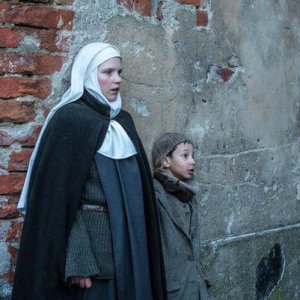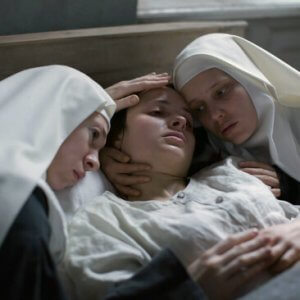Faith is twenty four hours of doubt, and one minute of hope.
Serene liturgical music fills the ears as the film opens, the voices of women, nuns in a contemplative convent. And we are held there, just long enough, long enough to feel the way a sacred space can open something within us, can deepen and enrich. It is moments like these that draw monastics to such places, but it resonates with all of us. It is beautiful and contemplative, but just as we are getting comfortable we hear a woman’s screaming, her cries of suffering echo among the walls of the convent, transgressing our reflective mood and breaking our peace. Even more disturbing: the nuns continue singing the liturgy. We realize that for the nuns, this is a cry that is horrifically familiar.
As far as films set in religious contexts, The Innocents has to be one of the best that I’ve seen. It is a French film, set in post-World War 2 Poland. It is winter, December of 1945, and a young French Red Cross medical student, Mathilde Beaulieu (Lou de Laâge), is sent to Poland as part of a medical mission to assist the survivors of the war, but she finds herself confronted by the terrible reality she finds in the convent. Polish nuns, women who have devoted themselves to God and to prayer, have been brutally raped and abused, both by German and Russian soldiers. The result is that many are pregnant. The convent is threatened, the faith of many is in ruins, and the women could be exposed to even more vulnerability and brutality.
Transgressions
Visually, the film often directs the viewer to the walls of the convent, both outside and within. Stark, often colorless and subdued, one might be tempted to relegate the walls to background, as we so often do, but there is rich meaning here as the film’s story unfold, meaning that is both cinematic and also spiritual and theological.
The word transgression kept coming to my mind as I watched this very important film. It was never stated, but I saw it everywhere. The Polish borders are transgressed, the Polish people have been transgressed, the walls of the convent have been transgressed, the monastic rules and vows have been transgressed, the contemplative stillness has been transgressed, and also transgressed is the dignity and honor of the women in the convent. And further transgressions must continue, more monastic rules and vows must be broken, simply to treat the prior transgressions, to heal from the wounds.
 This film called me back to a more basic and often overlooked theological meaning of transgression in a way that perhaps only a film could do. The term “transgression” is often abstracted from real life.
This film called me back to a more basic and often overlooked theological meaning of transgression in a way that perhaps only a film could do. The term “transgression” is often abstracted from real life.
We commonly use the word when referring to the violation of laws, and this likely has to do with the shaping of our English language by Christian theology, where the term “transgression” is almost exclusively used to refer to breaking laws. The abstraction of the term then allows us to rush our theology from one theoretical point to the next, but we are missing something more basic when we fixate on the theoretical meaning of transgression.
The Innocents, by contrast, forces us to consider something visceral: the transgression of the innocent bodies of women by men during a man’s war. There are few things as real as sexually transgressing the body, and the film is able to demonstrate the reality of this transgression through the lives of its characters, relying primarily on narrative tension, with a very minimal amount of graphic violence. This is no small accomplishment.
To transgress is to violate a boundary, to infringe, to breach, to contravene, to violate. More fundamental than transgressing laws is transgressing persons, more basic than law is our relationship to others and to the greater world.
One Minute of Hope: Invitation and Communion
As the story progresses, the very survival of the convent is at stake, and this threatens to put at risk all of the nuns who rely on the convent, many of whom are now pregnant and would be subject to scandal. Were any hint of this scandal to become known, however, the convent itself would be disgraced within the greater community and almost certainly disbanded, and for this reason the Mother has resorted to a very drastic and tragic solution, one that compromises and transgresses her own integrity, indeed endangers her very soul.
Late in the film, however, the medical student Beaulieu hits on an ingenious idea for preserving the convent. Her idea is controversial because it means that the walls of the convent must be breached, again, and in a way that radically alters the nature of the convent — yet this time it would not be a transgression of violent intrusion imposed by an abuser, this would be based on an invitation, an invitation to another vulnerable group with the possible result that a new form of monastic communion might take shape. In a plot turn that is rich with theological meaning and implication, the convent stands poised to be given a new raison d’être.
The Sacred and the Immanent
Given the quality of this film and it’s religious context, I consider The Innocents to be a must-see for people of faith. It is a very intense film, but there is much content for discussion, especially within a small group setting. There are many different spiritual and theological themes that weave through the narrative, begging to be discussed, themes that connect us with both the essence of faith and with the movings of our culture.
Like the visceral nature of the film itself, it returns us to something very basic about faith and of hope. If we can get back to the more visceral, basic sense of the word “transgression,” then perhaps we can return to the most basic way in which war and violence leaves the vulnerable even more exposed to violation and abuse, to transgression in its most real and most horrific sense.
 This is a war movie made by women and made about women, and as such it does something unique and it tells a story that we desperately need to hear, a narrative that stands in spiritual opposition to the narrative that glorifies war and stokes nationalist pride. Yet this film is not merely a movie about “the horrors of war,” intent on scaring us with intense violence. It’s doing something much more important. There are scant few scenes of graphic violence. Christy Lemire notes that the cool observational style of the film “lets the inherent horror of the film’s situation speak for itself.” Hence there is something much more personal, I would suggest, even spiritual about the film.
This is a war movie made by women and made about women, and as such it does something unique and it tells a story that we desperately need to hear, a narrative that stands in spiritual opposition to the narrative that glorifies war and stokes nationalist pride. Yet this film is not merely a movie about “the horrors of war,” intent on scaring us with intense violence. It’s doing something much more important. There are scant few scenes of graphic violence. Christy Lemire notes that the cool observational style of the film “lets the inherent horror of the film’s situation speak for itself.” Hence there is something much more personal, I would suggest, even spiritual about the film.
Where do we locate the sacred? Is it found in the rules we follow? Perhaps. Is it something we calculate by way of a judicial atonement formula or theological algorithm, measuring up our actions to “the law of God”? Possibly. But there is something more immanent, more bodily, more of this world, and hence of greater spiritual importance, yet it is something that often gets lost. It is about the way in which we related to each other and to our world, and The Innocents is a film that speaks to transgression in its most immanent and hence most spiritual sense.
While masculine hero-narratives abstract war and then use violence as a means to glorify the male ego, The Innocents calls us back to the visceral reality of what actually happens in war: women are raped and the vulnerable are made to endure unrestrained abuse and cruelty. In America, it is deeply disturbing that Christians so readily support politicians who resort to violence and glorify war. In this sense I consider the film prophetic, a stark narrative on the essential nature of transgression, a cinematic plea, as it were, to question and contest leaders and institutions that justify and perpetuate violence.




